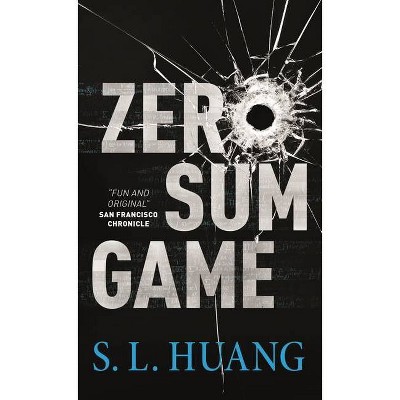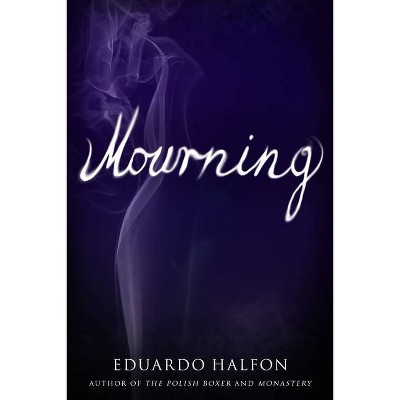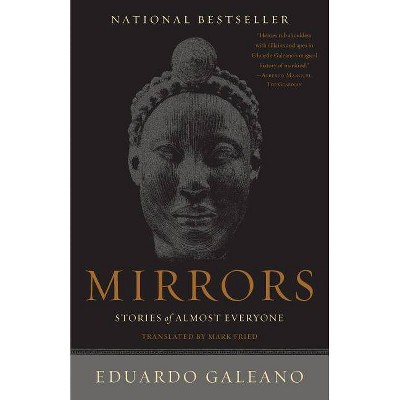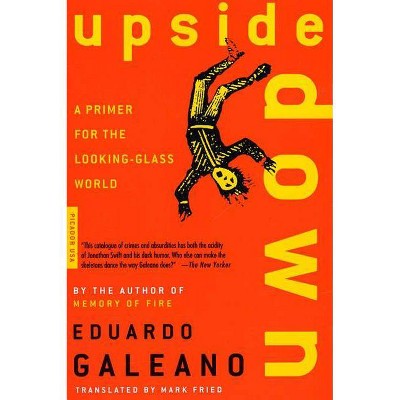A Zero-Sum Game - by Eduardo Rabasa (Paperback)
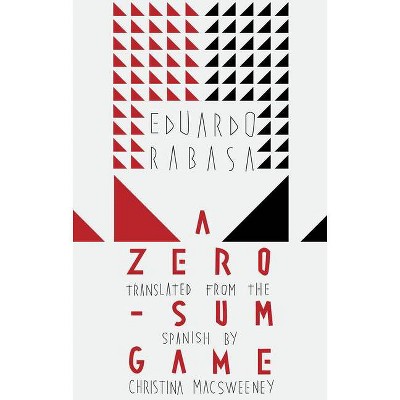
Similar Products
Products of same category from the store
AllProduct info
<p/><br></br><p><b> About the Book </b></p></br></br>Debut from Mexico20-nominated author examines humanity's dark side in fatalistic satire of consumer society and the cult of the individual.<p/><br></br><p><b> Book Synopsis </b></p></br></br><p>Outstanding political fantasy. Eduardo Rabasa has written a futuristic novel set in the present; its inventiveness is not based on new technologies but rather on new kinds of relationships. -- <b>Juan Villoro</b></p><p>A hilarious satire and universal exploration of the origins of power and corruption. <i>A Zero-Sum Game </i>uses the highly-charged election for the presidency of a residents' committee and the influence of a powerful stranger to both expose those in power and to sympathize with individuals who find themselves caught in the paradox of empowerment and impotence that is modern consumer society and the democratic state.</p><p>Eduardo Rabasa is the founding editorial director of Sexto Piso, Mexico's most prominent independent publishing house, and was selected to the Hay Festival's México20 list of the greatest Mexican authors under the age of forty.</p><br><p/><br></br><p><b> Review Quotes </b></p></br></br><br><i>A Zero-Sum Game</i> is not only a brilliant novel: it may well be THE brilliant novel of our time, a book that captures all of the delusion, deceit, and absurdity of a world given over entirely to the dictates of capitalism. Eduardo Rabasa has written a tragedy, to be sure, a twisted boundary-pushing tragedy that also happens to be insanely funny. If humans are reading novels a hundred years from now, they will be reading <i>A Zero-Sum Game</i>, and laughing and weeping in equal measure." -- <b>Ben Fountain, author of <i>Billy Lynn's Long Halftime Walk</i></b>Rabasa uses various narrative devices to make a rambunctious journey through the layers of corruption and the various faces of power in a housing complex that could be anywhere. -- <b>Jane Ciabattari, <i>BBC Culture</i></b> <p/>Rabasa's novel is built much like the sprawling housing complex it portrays: a complex but self-contained set of ideas populated by funny and frightening characters. Rabasa has crafted an Orwellian satire of low-level bureaucrats, urban dreamers, and political power." -- <b><i>Publishers Weekly</i></b> <p/>A tome that keeps you on your toes, dancing between various characters' perspectives, different styles of narration, and abstract political lecturing... Christina MacSweeney... preserves the complicated structure and alternating voices of the novel impressively. -- <b>Madeline Jones, <i>Asymptote Journal</i></b> <p/>With echoes of <i>1984</i> and <i>Brave New World</i>, Rabasa delivers a forceful, hysterical debut that's one for the political ages. This timely novel riffs on challenges that are at the fore globally--drugs, poverty, and class division. A Zero Sum Game is a welcome addition to contemporary Mexican literature, with a voice and intellect that is astute and vibrant, providing much-needed commentary on Mexican-American relations and the abuses of capitalism. -- <b>Monica Carter, <i>Foreword Reviews</i></b> <p/>Rabasa uses the charged atmosphere to crack dry, wry jokes that manage to lend sympathy to both sides: those in power, who find themselves caught between empowerment and selling out, and those outside of it, who find themselves wanting to be part of a revolution. It's complex, intense, and would be heavy were the book not so charmingly funny." -- <b>Cassidy Foust, <i>Literary Hub</i></b> <p/>"Sprawling, unwieldy, hilarious, and terrifying... Rabasa's book mercilessly scrutinizes and critiques modern consumerism and the democratic state. -- <b>Rachel Cordasco, <i>Bookriot</i></b> <p/>"An insightful political dystopia" -- <b>Andrea Gregovich, <i>Fiction Advocate</i></b> <p/>Rich with the absurdity and excess of human folly, <i>A Zero-Sum Game</i> is a satire bursting with invention. Eduardo Rabasa displays the keen eye of a Huxley or a Vonnegut, mocking our obsession with progress, our endless consumerism and our desire for utopia. Villa Miserias could be a stand-in for any city in any country in the world. Hilarious and original, Rabasa's debut is pure joy and the introduction of an exciting new voice. -- <b>Mark Haber, bookseller, Brazos Bookstore (Houston, Texas)</b> <p/>The comparisons to <i>1984</i> are inevitable . . . However, <i>A Zero-Sum Game</i> is closer to <i>A Brave New World</i> than to Orwellian dystopia. -- <b>Victor Parkas, <i>El País</i></b> <p/>Meticulous, written with harsh language, this is the portrait of a suffocating microcosm in which hierarchies are fixed by the illusion of a social progress that will never arrive. Rabasa dismantles with precision the mechanisms of a false democracy, in which no political alternative is possible (...) A mirror of some Latin American countries, this dense novel offers a pertinent reflection about the ways in which a regime can exercise violence today: less by outright repression and more through its capacity of imposing a deadly lethargy on people. -- <b>Ariane Singer, <i>Le Monde</i></b> <p/><i>A Zero-Sum Game</i> is an outstanding political fantasy. Eduardo Rabasa has written a futuristic novel set in the present; its inventiveness is not based on new technologies but rather on new kinds of relationships. It's a novel about the most complicated of extreme sports: cohabitation. -- <b>Juan Villoro, author of <i>The Guilty</i></b> <p/>An amazing novel. On reading it, I felt myself to be immersed in a world that, as in certain works by Bolaño, transcends the characteristics typically associated with the Latin American novel. <i>A Zero-Sum Game</i> carries readers to regions of the imagination which subtly suggest the best of the Central European tradition. The sensation is as real as it is unsettling and, somehow, after a time, gives rise to an awareness of where we actually are. The prose rests firmly on a set of coordinates that can only be Mexican, revealing a totality of truths that reflect the complex texture of a country and a society immersed in a moment of violent convulsion. Few recent novels have managed to surprise me so greatly as <i>A Zero-Sum Game</i>. -- <b>Eduardo Lago, author of <i>Call Me Brooklyn</i></b> <p/>"A very impressive piece of work, in particular also in its creative approach to the concept of 'political fiction', and in suggesting what fiction can still do." -- <b>M.A. Orthofer, <i>The Complete Review</i></b> <p/>This is an important novel. In terms of narrative, what the literary critics might call the central theme --power, our relationship with power, the power of power--is very deftly handled, and is combined with stories that interweave in perfect harmony. Rabasa's decision to set the novel in an insignificant place, which works as a mirror to anywhere in the world, was a very wise one; more wise still is the satirical tone which reveals itself in his functional prose (that is, prose that functions well). Nowhere in recent times have I read a better portrait of how things are shaped - or how those things, over time, shape us. -- <b>Juan Bonilla</b> <p/>Rabasa's first novel collects outbursts of passionate love, the conflicted relationship between a father and a son, and, above all, a critique of democracy in the shape of political satire (...) Rabasa provides an unexpected twist to the genre of novels of social criticism, a literary tradition from which the author hopes to obtain the formula that allows him to think and understand the present. (...) A demolishing piece of work, perfectly suited for Rabasa, an eternal restless soul, and one who invites to share in the pleasure of literature from his double role as a publisher and writer. -- <b>Leonardo Tarifeño, <i>Revista Vice</i></b> <p/>Rabasa's satirical vocation is cristallized in a cumulative effect that at times recalls the transversal cut with which Georges Perec sketched the life of the tenants of a building, or the eagle-eye with which Damián Tabarovsky followed the comings and goings of a leaf that glides over a street of Buenos Aires. -- <b>Guillermo Núñez, <i>Frente</i></b> <p/>By using diverse narrative resources (...) Rabasa manages to maintain from the beginning to the end a sensation of breathing inside a gray and oppressive bubble in which the [Nietzschean] motto 'the measure of every man lies in the dose of truth which he can handle' takes on a disturbing sense. This sense points out, without the need of being violent, that we are always whipped by an invisible watchman, intransigent and ruthless. -- <b>Lobsang Castañeda, <i>Revista Más cultura</i></b> <p/>By using a satirical tone, Eduardo Rabasa allows himself to explore the limits of political coexistence while at the same time offering fragments that come out of an overflowing imagination. His novel becomes a carnival in which the reader cannot help but find similarities with what has happened to our country, to mention just one of the possibilities. And, in doing so, he manages to outline deep reflections on the concepts of truth, of the greater good, and of the individual. -- <b>Jorge Gudiño, <i>La Jornada</i></b> <p/>A satirical and hallucinatory debut. -- <b>Donato M. Plata, <i>Revista Cinepremiere</i></b><br><br>Rabasa uses various narrative devices to make a rambunctious journey through the layers of corruption and the various faces of power in a housing complex that could be anywhere. -- <strong>Jane Ciabattari, <em>BBC Culture</em></strong> <p/>Rabasa's novel is built much like the sprawling housing complex it portrays: a complex but self-contained set of ideas populated by funny and frightening characters. Rabasa has crafted an Orwellian satire of low-level bureaucrats, urban dreamers, and political power." -- <strong><em>Publishers Weekly</em></strong> <p/>A tome that keeps you on your toes, dancing between various characters' perspectives, different styles of narration, and abstract political lecturing... Christina MacSweeney... preserves the complicated structure and alternating voices of the novel impressively. -- <strong>Madeline Jones, <em>Asymptote Journal</em></strong> <p/>With echoes of <em>1984</em> and <em>Brave New World</em>, Rabasa delivers a forceful, hysterical debut that's one for the political ages. This timely novel riffs on challenges that are at the fore globally--drugs, poverty, and class division. A Zero Sum Game is a welcome addition to contemporary Mexican literature, with a voice and intellect that is astute and vibrant, providing much-needed commentary on Mexican-American relations and the abuses of capitalism. -- <strong>Monica Carter, <em>Foreword Reviews</em></strong> <p/>Rabasa uses the charged atmosphere to crack dry, wry jokes that manage to lend sympathy to both sides: those in power, who find themselves caught between empowerment and selling out, and those outside of it, who find themselves wanting to be part of a revolution. It's complex, intense, and would be heavy were the book not so charmingly funny." -- <strong>Cassidy Foust, <em>Literary Hub</em></strong> <p/>"Sprawling, unwieldy, hilarious, and terrifying... Rabasa's book mercilessly scrutinizes and critiques modern consumerism and the democratic state. -- <strong>Rachel Cordasco, <em>Bookriot</em></strong> <p/>"An insightful political dystopia" -- <strong>Andrea Gregovich, <em>Fiction Advocate</em></strong> <p/>"A critique like this on the potential pitfalls of democracy rings with an eerily relevant timbre." -- <strong>Gabriel García Ochoa, <em>Harvard Review</em></strong> <p/>Rich with the absurdity and excess of human folly, <em>A Zero-Sum Game</em> is a satire bursting with invention. Eduardo Rabasa displays the keen eye of a Huxley or a Vonnegut, mocking our obsession with progress, our endless consumerism and our desire for utopia. Villa Miserias could be a stand-in for any city in any country in the world. Hilarious and original, Rabasa's debut is pure joy and the introduction of an exciting new voice. -- <strong>Mark Haber, bookseller, Brazos Bookstore (Houston, Texas)</strong> <p/>The comparisons to <em>1984</em> are inevitable . . . However, <em>A Zero-Sum Game</em> is closer to <em>A Brave New World</em> than to Orwellian dystopia. -- <strong>Victor Parkas, <em>El País</em></strong> <p/>"A compelling mix of satirical humor and chilling realism." -- <strong>Jen Rickard Blair, <em>World Literature Today</em></strong> <p/>Meticulous, written with harsh language, this is the portrait of a suffocating microcosm in which hierarchies are fixed by the illusion of a social progress that will never arrive. Rabasa dismantles with precision the mechanisms of a false democracy, in which no political alternative is possible (...) A mirror of some Latin American countries, this dense novel offers a pertinent reflection about the ways in which a regime can exercise violence today: less by outright repression and more through its capacity of imposing a deadly lethargy on people. -- <strong>Ariane Singer, <em>Le Monde</em></strong> <p/><em>A Zero-Sum Game</em> is an outstanding political fantasy. Eduardo Rabasa has written a futuristic novel set in the present; its inventiveness is not based on new technologies but rather on new kinds of relationships. It's a novel about the most complicated of extreme sports: cohabitation. -- <strong>Juan Villoro, author of <em>The Guilty</em></strong> <p/>An amazing novel. On reading it, I felt myself to be immersed in a world that, as in certain works by Bolaño, transcends the characteristics typically associated with the Latin American novel. <em>A Zero-Sum Game</em> carries readers to regions of the imagination which subtly suggest the best of the Central European tradition. The sensation is as real as it is unsettling and, somehow, after a time, gives rise to an awareness of where we actually are. The prose rests firmly on a set of coordinates that can only be Mexican, revealing a totality of truths that reflect the complex texture of a country and a society immersed in a moment of violent convulsion. Few recent novels have managed to surprise me so greatly as <em>A Zero-Sum Game</em>. -- <strong>Eduardo Lago, author of <em>Call Me Brooklyn</em></strong> <p/>"A very impressive piece of work, in particular also in its creative approach to the concept of 'political fiction', and in suggesting what fiction can still do." -- <strong>M.A. Orthofer, <em>The Complete Review</em></strong> <p/>This is an important novel. In terms of narrative, what the literary critics might call the central theme --power, our relationship with power, the power of power--is very deftly handled, and is combined with stories that interweave in perfect harmony. Rabasa's decision to set the novel in an insignificant place, which works as a mirror to anywhere in the world, was a very wise one; more wise still is the satirical tone which reveals itself in his functional prose (that is, prose that functions well). Nowhere in recent times have I read a better portrait of how things are shaped - or how those things, over time, shape us. -- <strong>Juan Bonilla</strong> <p/>Rabasa's first novel collects outbursts of passionate love, the conflicted relationship between a father and a son, and, above all, a critique of democracy in the shape of political satire (...) Rabasa provides an unexpected twist to the genre of novels of social criticism, a literary tradition from which the author hopes to obtain the formula that allows him to think and understand the present. (...) A demolishing piece of work, perfectly suited for Rabasa, an eternal restless soul, and one who invites to share in the pleasure of literature from his double role as a publisher and writer. -- <strong>Leonardo Tarifeño, <em>Revista Vice</em></strong> <p/>Rabasa's satirical vocation is cristallized in a cumulative effect that at times recalls the transversal cut with which Georges Perec sketched the life of the tenants of a building, or the eagle-eye with which Damián Tabarovsky followed the comings and goings of a leaf that glides over a street of Buenos Aires. -- <strong>Guillermo Núñez, <em>Frente</em></strong> <p/>By using diverse narrative resources (...) Rabasa manages to maintain from the beginning to the end a sensation of breathing inside a gray and oppressive bubble in which the [Nietzschean] motto 'the measure of every man lies in the dose of truth which he can handle' takes on a disturbing sense. This sense points out, without the need of being violent, that we are always whipped by an invisible watchman, intransigent and ruthless. -- <strong>Lobsang Castañeda, <em>Revista Más cultura</em></strong> <p/>By using a satirical tone, Eduardo Rabasa allows himself to explore the limits of political coexistence while at the same time offering fragments that come out of an overflowing imagination. His novel becomes a carnival in which the reader cannot help but find similarities with what has happened to our country, to mention just one of the possibilities. And, in doing so, he manages to outline deep reflections on the concepts of truth, of the greater good, and of the individual. -- <strong>Jorge Gudiño, <em>La Jornada</em></strong> <p/>A satirical and hallucinatory debut. -- <strong>Donato M. Plata, <em>Revista Cinepremiere</em></strong><br>"A Zero-Sum Game is not only a brilliant novel: it may well be the brilliant novel of our time, a book that captures all of the delusion, deceit, and absurdity of a world given over entirely to the dictates of capitalism. Eduardo Rabasa has written a tragedy, to be sure, a twisted boundary-pushing tragedy that also happens to be insanely funny. If humans are reading novels a hundred years from now, they will be reading A Zero-Sum Game, and laughing and weeping in equal measure." -- <strong>Ben Fountain, <em>Billy Lynn's Long Halftime Walk</em></strong><br><br><p/><br></br><p><b> About the Author </b></p></br></br>Eduardo Rabasa studied political science at Mexico's National University (UNAM), where he graduated with a thesis on the concept of power in the work of George Orwell. He writes a weekly column for the national newspaper Milenio, and has translated books of authors like Morris Berman, George Orwell and W. Somerset Maugham. In 2002 he co-founded Sexto Piso, recognized as one of Mexico's leading independent publishers, where he currently serves as editorial director. <i>A Zero-Sum Game</i> is his debut novel, published in Mexico by Surplus Ediciones (Sur+), in Spain by Pepitas de calabaza, in Argentina by Godot Ediciones, in France by Éditions Piranha, and in the US by Deep Vellum. In 2015, he was selected among the best 20 young Mexican contemporary authors in the Hay Festival's <i>México20</i> project. <p/>Christina MacSweeney is a literary translator specializing in Latin American fiction. Her translations of Valeria Luiselli's works were published by Granta and Coffee House Press in 2012 and 2013 and 2015 respectively; her translation of Luiselli's <i>Faces in the Crowd</i> was a finalist for the Best Translated Book Award in 2015, and <i>The Story of My Teeth</i> was a finalist for the same award in 2016, and won the <i>Los Angeles Times</i> Fiction Prize. Her work has also appeared in the anthologies <i>México20</i>, and <i>Lunatics, Lovers and Poets: Twelve Stories after Cervantes and Shakespeare</i> (And Other Stories, 2016). Her most recent published translation, Daniel Saldaña París's <i>Among Strange Victims</i>, was published by Coffee House Press in spring 2016, and a short story, Piñata, by the same author was included in the 2016 National Translation Month publications.<br>
Price History
Price Archive shows prices from various stores, lets you see history and find the cheapest. There is no actual sale on the website. For all support, inquiry and suggestion messagescommunication@pricearchive.us
